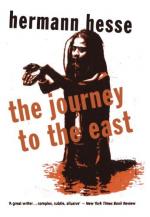
|
| Name: _________________________ | Period: ___________________ |
This test consists of 15 multiple choice questions and 5 short answer questions.
Multiple Choice Questions
1. In Part I, what does the narrator say world history often seems like?
(a) Glorious revelations of previous generations.
(b) Humanity's desire to erase its memory.
(c) A waste of time to study.
(d) A short respite between national wars.
2. According to H.H., what does the disappearance of a particular member threaten?
(a) The value and meaning of everything, even life.
(b) The future of the League.
(c) Leo's ability to perform magic.
(d) The secrecy of the League.
3. In Part I, what does the narrator realize about the Journey East?
(a) It is a long and difficult journey.
(b) It is a procession of believers moving towards the East.
(c) It is a single pilgrmage.
(d) It brings full enlightment to each traveler.
4. How does H.H. describe his demeanor in Part II?
(a) He has feelings of sadness and doubt.
(b) He becomes determined to succeed.
(c) He becomes angry and sullen.
(d) He is restless.
5. What is the unanimously observed rule of the group?
(a) Go to Africa and rescue a member from the Moors.
(b) Convert unbelievers along their journey,
(c) Pay homage to all the ancient places of the League.
(d) Preach their gospel to all they met.
6. What is the narrator's life-goal?
(a) To travel with Roland.
(b) To understand the "Tao".
(c) To win the love of Princess Fatima.
(d) To capture a magical snake.
7. In Part II, what does H.H. say most historians want to do?
(a) Portray only what is important to them.
(b) Portray events as they see them.
(c) Portray events sincerely.
(d) Portray only what they want to remember.
8. What is placed on the narrator as he is admitted into the League?
(a) A simple brown robe with a cowl.
(b) The League ring is placed on his finger.
(c) A black fez with a red tassle and gold crescent.
(d) A brilliant purple cape with gold embroidery.
9. What does H.H. says happens when he examines things too closely?
(a) THey are imprinted forever in his memory.
(b) They become a heavy burden.
(c) They come into sharp relief.
(d) They slip away and dissolve.
10. What does the narrator say is in the East that disciples are traveling towards?
(a) The great temple of Kundalini.
(b) The Home of LIght.
(c) The Bacchanalian feast.
(d) The dawning of the Third Empire.
11. According to H.H., what must the historian do to allow meaning into a narrative?
(a) Provide a common thread of knowlege for all of history.
(b) Create realistic scenes with vivid imagery.
(c) Invent units, heroes, nations, and ideas.
(d) Remain as true to the actual events as possible.
12. What is the deserter relieved of by the Speaker in Part I?
(a) His cloak.
(b) His vow of silence.
(c) His prayer book.
(d) His personal journal.
13. In Part I, what is Longus doing in "the wood"?
(a) Writing Greek and Hebrew.
(b) Carving his enchantment flute.
(c) Meditating with Leo.
(d) Playing with two white dogs.
14. What does the narrator say about Leo at the end of Part I?
(a) He is closer than a brother to the narrator.
(b) He probably knows more than the entire group.
(c) He is the holder of Solomon's Key.
(d) He is very unreliable.
15. What does H.H. say his belief is susceptible to in Part II?
(a) The whims of his emotions.
(b) Many different opions.
(c) The persuasion of the leader.
(d) The success of the journey.
Short Answer Questions
1. In Part II, what does H.H. say is the only important thing in his life?
2. In Part II, another person on the journey claims what about certain writings?
3. Mohamed's coffin is believed to hold what magical power?
4. What does the Leader say about "grace" in Part I?
5. How does H.H. describe certain articles in Part II?
|
This section contains 703 words (approx. 3 pages at 300 words per page) |

|




